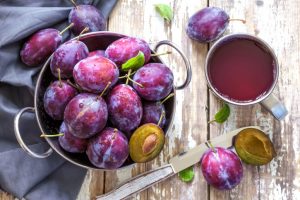Warmer weather brings in-season fruits and vegetables – and trips to your local farmer’s market are a must.
Fruits, in particular, are an integral part of a healthy diet and when they are in season they are that much easier to enjoy.
One fruit you should be eating more of is the humble and delicious plum. Small in size, big in natural sweetness, plums health benefits are not to be missed.
If up until now you’ve eaten plums without realizing the benefits, let us shed some light on this healthy fruit and give you more reason to eat more of them all season long.
There has been some recent buzz around plums for their ability to reduce the problems associated with obesity. The University of Southern Queensland gave obese rats plum juice in their food, and the rats’ blood pressure, fatty liver, arthritis and heart issues began to return to normal.
Although the study was conducted on laboratory rats, it offers some insight as to what plum health benefits may occur in humans. So if you’re not eating plums yet, here is what you need to know about this potential superfood.
What are plums?
Besides being a round fruit, plums are related to peaches, almonds and nectarines. At their core, they have a seed which is protected by a pit. Plums are usually available between May and October, peaking in August.
There are more than 2,000 different varieties of plums with 100 of them grown in the United States.
Plums can range in color from purple to red, to green and even amber. When dried, plums become prunes which are sweet and available year-round.
Prunes, like plums, also offer a variety of health benefits.
Sitting plum on nutrition
Plums rank low in calories as well as low on the glycemic index. Foods that rank low on the glycemic index mean they will not cause spikes in blood sugar which makes them safe to enjoy by diabetics. Other nutrients in plums include vitamins C and K, copper, fiber and potassium.
Health benefits of plums
The nutrients in plums are what aid in the plums health benefits. From anti-aging, to benefits to skin, hair and overall health, the plum should be enjoyed daily for maximum benefits.
Ease digestion
The fiber content of plums makes it beneficial for easing constipation as well as aiding in digestion problems.
Heart health
Prunes’ level of potassium benefits heart health. Not only is potassium beneficial for regulating blood pressure, it can reduce the risk of stroke as well. Fiber is also helpful in reducing bad cholesterol.
 Bone health: Florida State and Oklahoma State universities both studied the effects of prunes on bone health. One group ate prunes and the other group ate dried apples; both groups received calcium and vitamin D as well. In comparison, the prune group was found to have higher bone mineral density.
Bone health: Florida State and Oklahoma State universities both studied the effects of prunes on bone health. One group ate prunes and the other group ate dried apples; both groups received calcium and vitamin D as well. In comparison, the prune group was found to have higher bone mineral density.
Weight loss: If you’re looking for a snack to help manage your weight, look no further than plums. They’re low in calories and sweet so you won’t be left craving desserts and other sugary options. Also, because plums help you stay regular, they can remove waste which may be lingering in your colon, a further aid to weight loss.
 Diabetes: As mentioned, plums have a low glycemic index so they are good for diabetics. Plum health benefits then include the regulation of blood sugar and can help reduce the risk of type 2 diabetes as a low-sugar snack.
Diabetes: As mentioned, plums have a low glycemic index so they are good for diabetics. Plum health benefits then include the regulation of blood sugar and can help reduce the risk of type 2 diabetes as a low-sugar snack.
Antioxidant: Antioxidants are beneficial for the body because they can fight off free-radical damage which can harm such bodily functions like memory and vision. Plum health benefits include antioxidants to help keep the body healthy.
Hydration: Plums have a high water content, so if you’re looking for a snack to also keep you hydrated, plums are a great choice.
Improve skin tone: Because free-radical damage can change the look of skin, the antioxidants in plums can also help improve skin tone.
 Sun protection: If you like to spend time outdoors, adding more plums to your diet can also help improve protection against the sun’s harmful ultraviolet rays (but don’t skip the sunscreen). Antioxidants in plums can promote skin growth and protect against sun damage.
Sun protection: If you like to spend time outdoors, adding more plums to your diet can also help improve protection against the sun’s harmful ultraviolet rays (but don’t skip the sunscreen). Antioxidants in plums can promote skin growth and protect against sun damage.
Hair growth: Hair can become thin and brittle over time, so the vitamins and antioxidants in plums can promote hair strength.
Delicious plum recipes
As you can see, plums can offer health benefits for just about every part of the body. From skin, to hair to even protecting your heart and vision, so eating plums more often is a great way to obtain their health benefits. Besides eating plums on their own, or dried prunes, here are some other ways you can enjoy your plums.
Baked plums
Now here’s a sweet treat! Preheat your oven to 400 degrees. Place a little butter in a shallow baking dish and melt in preheating oven. Remove your baking dish from the oven and add equal parts honey and orange juice to the pan and stir to combine.
Put some halved and pitted plums, cut-side down, in the dish. Then bake about half an hour, turning once in the last 10 minutes to spoon juices over the fruit. Serve warm with yogurt, ice cream or on their own. Delicious!
Plum sauce
Plum sauce is a great side to such dishes as dumplings, or baked chicken wings or chicken fingers. It can add sweetness to meats and is great for dipping.
Make it at home by combining plum jam, vinegar, brown sugar, onions, red pepper flakes (omit if you don’t like spicy), garlic and ginger.
By making plum recipes at home, you can control what goes into it and you won’t have the extra additives, preservatives and sodium.
A plum a day keeps the doctor away
As you can see, plums can offer many benefits to health and so if you haven’t already, start enjoying them every day. Their antioxidant power will lead to improved health and better well-being. And their natural sweetness means you’ll love them on their own or combined with just about anything. Versatile nutrition all the way!



No comments:
Post a Comment